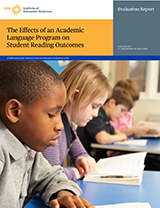The Effects of an Academic Language Program on Student Reading Outcomes

 Academic language skills are critical supports for reading and understanding content for all students, particularly for English learners and economically disadvantaged students whose achievement typically lags behind their peers. This study tested WordGen Elementary, a program to improve fourth- and fifth-grade students’ ability to understand the academic language used in school and support their reading achievement. The supplemental program included reading, speaking, and writing activities for students and training for teachers. About 60 schools were randomly assigned to implement the program for one school year or to continue using their typical strategies. The study compared the average reading performance of the two groups at the end of the program year and again one year later to assess the program’s effectiveness.
Academic language skills are critical supports for reading and understanding content for all students, particularly for English learners and economically disadvantaged students whose achievement typically lags behind their peers. This study tested WordGen Elementary, a program to improve fourth- and fifth-grade students’ ability to understand the academic language used in school and support their reading achievement. The supplemental program included reading, speaking, and writing activities for students and training for teachers. About 60 schools were randomly assigned to implement the program for one school year or to continue using their typical strategies. The study compared the average reading performance of the two groups at the end of the program year and again one year later to assess the program’s effectiveness.
Key Findings
- The program did not improve reading outcomes for students overall. Students’ English language arts test scores were similar in program and non-program group schools. There were also no differences between the two groups in reading comprehension or the type of academic language skills targeted by the program.
- The program also did not improve outcomes for English learners or economically disadvantaged students. Despite the program’s attention to the needs of English learners and students from economically disadvantaged backgrounds, it also had no effect on the English language arts test scores, reading comprehension, or academic language skills of these students.
- While the program targeted three types of instructional strategies, it changed teachers’ classroom practice for only one. Teachers in program schools used more word knowledge instructional strategies than teachers in non-program schools. But the two groups of teachers did not differ in academic skills instruction or how much they provided students with opportunities to practice academic language. The limited effects on teachers’ practices may be due to the challenges they faced both participating in the planned professional development, particularly the ongoing guidance and reflection sessions over the program year, and incorporating the program’s lessons in the classroom.
Given that teachers found it difficult to fit the program activities into their existing instructional time, more or different strategies to support teachers may be needed than were provided by the study. The study also suggests that professional development providers may want to consider different ways to support teachers’ implementation of more difficult practices, like academic skills instruction and facilitating student practice opportunities.







